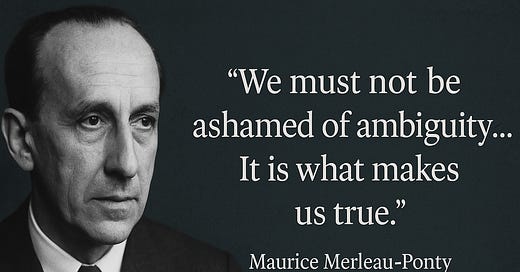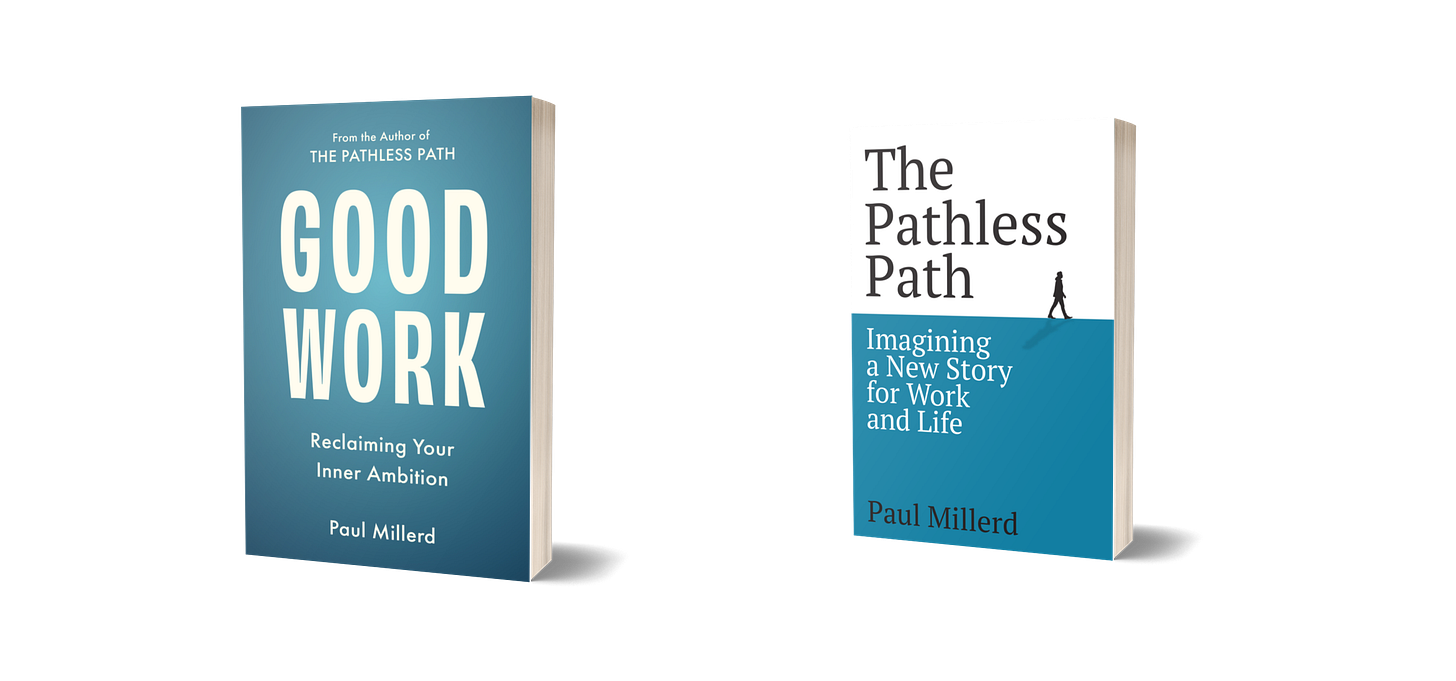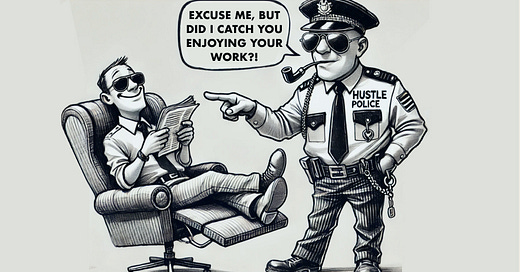April 13th, 2025: Greetings from Taichung. We had a successful 16.5 hour flight with our daughter earlier this week and we are settling in. We just got back from the night market and I’m enjoying being back in Taiwan. This weeks issue is a bit of a winding essay about trying to find a good relationship with writing and sharing ideas online. I still don’t have the right approach so I’d love to hear comments or reactions to the note below.
#1 How To Stay Sane
I am struggling to find a healthy way of sharing ideas online in 2025. I wrote about this a couple of months ago but I wanted to try to make sense of how I’m feeling once more.
The intellectual commons has become an informational battlefield where attention is being competed for by more stakeholders than ever before. Raw curiosity and good faith are outcompeted and out-priced by political talking points, bots, and sales pitches. The people who would otherwise be happy to contribute to such spaces are in retreat.
The internet is always changing. I remember when I ran a humble Facebook group called “Media Feast” where about 50 people would share thoughtful reflections on longform essays and how lucky I felt to have the space. I was somewhat intellectually starved at the time and was desperate to find others online sharing ideas.
Things did get way better. There is so much more great writing and thoughtful people sharing ideas online. For many years, there seemed to be an intellectual commons emerging that looked like it might give people an alternative to pursuing intellectual work in traditional institutions. But since the 2024 election, I’m not so sure. It seems that political parties now realize that every ounce of online attention can be farmed and used toward their aims. Politicians will increasingly become the high bidders and shape the reality in these spaces. And for many, they can’t resist playing along. Many people find it thrilling to win internet points to trade for clout in their imaginary world or now for many, for IRL status. Maybe this is great for the politically inclined but when it comes to online intellectual commons, it’s a tragedy.
Today’s online politics taps into a human creative impulse but in an incomplete way. It ignites a form of pseudo-creativity where one searches for the best “take” that drives engagement and helps one feel part of something. It delivers a quick hit of satisfaction but never lasts. We see powerful people drunk on the potential power searching for their own band of useful followers to help amplify their own aims. Everyone knows this is happening and there appears to be nothing we can do. The saddest thing is that these same impulses to aim for power and clout seem to hijack the attention of normal people who might otherwise channel their inner ambition toward something a little more interesting.
I try to remind myself that this too shall pass. That the mania of the day always becomes the mania of the past. That issues eventually change and people get a little more reasonable with time. But I care. I care about trying to mean what I say and being consistent with values I embrace. I want to participate in an intellectual commons that values thoughtfulness, civility, and depth. And I think this is the thing that frustrates me the most. For years, I did find a working system for engaging in intellectual conversation online that was generally positive and thoughtful. But in 2025, that world is just not existing in the way that helps me create in the same way I have in the past. I’m angry about this. I want people to give more of a shit. I want people to put their friends and families above their political allegiance. I want people to stop being so cynical about everything and to not sell themselves out for cheap feelings of belonging.
Of course, after I take a deep breath, I realize that I’m simply on these platforms too much. The internet has changed and I need to adapt. I remind myself that most people are reasonable. But the reasonable choice in 2025 is to sit on the sidelines and to not engage with the world of ideas. This hidden tribes report is something I think about a lot. It showed that about two thirds of people make up an “exhausted majority.” They purposefully avoid the intellectual commons I wish to revive.
With the recent trade war silliness, I’ve found myself trying to share perspectives on manufacturing. I have quite a bit of background researching manufacturing, working as a supply chain analyst, and working in several manufacturing plants. I want people to take this all more seriously. I actually would like to see us taking manufacturing more seriously but on terms that are based in reality in 2025 not in a 1950s fantasy. I want people to take seriously that potentially throwing the world into a financial crisis for an old man’s desires has some crazy downsides. But when I engage, I get tribalism and hot takes back. It’s not worth it and that sucks.
I don’t have the stomach for this world. I find myself getting cynical about it and for me, that’s a red flag on a path like this.1
At Angies naturalization ceremony a couple weeks ago, the judge presiding over the ceremony paused after the ceremony was complete and said he wanted to offer some thoughts. It’s a sign of being too online that I thought, “oh no he is going to make a political statement.” He did not. Instead, he reflected on his ancestors coming to America from Europe in the 1800s and how many of us are the ancestors of those who made similar journeys. He called out the people from 27 different countries that were becoming citizens that day and espoused many of the positive principle which have made the U.S. such a resilient and lasting country. Before he spoke I was curious about his political leanings but by the end I didn’t care. He cared about things in a deeper way. It reminded me that many of the most inspiring people are not in the “village square” of ideas and that most people are going through life performing the heroic act of doing what they can in their own small corner of the world.
As Angie walked back to meet us as the ceremony was ending, she had tears flowing down her face. I started crying too and gave her a hug. As someone coming from Taiwan, she always saw America as an aspirational place to live. While studying abroad at Arizona State University in college, she was amazed at the diversity of people, ideas, and land. She was overwhelmed by the freedom she felt to express parts of herself that had been harder to embrace in Taiwan. As she left at the end of the school year, she was determined to find a way back. She ended up going to grad school in New York but struggled to find a job afterward. She ended up in Taiwan and figured that the dream of living in the US was over.
That was when an American wandered into her life and since we decided to get married, much of our relationship has been shaped by her legal immigration journey. For more than five years, our life has been shaped as much by normal rituals as interviews, packets of thousands of pages of forms and proof of our relationship, and legal restrictions on where we could live. This lasted through three different presidential terms in which immigration became a hot button topic and where both parties used it to create constant division, never actually making serious attempts to improve anything at all. It was too valuable as a scissor issue.
In the last few months, the direct attacks against legal residents of my country have been scary to watch and I prayed that nothing would escalate further as we finished the citizenship journey.
But as I sat in the courtroom that day, I was grateful that while many of our political leaders have taken the low road, many have not. And this is a choice we can all make in our own little corners of the universe.
I started this post because a friend texted me this week and more or less said, “You seem frustrated via your posts online. You should write out what you are thinking in longform, that’s you at your best.” He was right. When I write, especially when I’m a bit frustrated, I tend to search for hope. I think in writing this, I’ve found a little bit to cling on to. But I’m still a realist. The outrage wars will continue. The celebration of cruelty and gaslighting from the current administration will continue. The same behavior from the other party will continue too. The abdication of thinking for tribal points from the masses will likely not slow down.
I’ve often wished I could flip a switch and snap people out of it. For nearly a decade now, I’ve watched people trade their personalities for a political identity. Suddenly every conversation is an opportunity to practice various talking points. Of course, my ego likes to tell me that if I just engage in good faith, maybe I’ll remind them that there are higher aims in life. That these political fights that convince people that many other people are evil are not worth it. But it almost always just ends up with me pulling myself down. I delude myself that I’m the noble one, wasting energy trying to pull people back into a conversation they no longer want to have.
And so I come here. Back to this place where I’ve earnestly tried to follow my curiosity for the past 7+ years. There’s never been a clear outcome goal with my writing. I write because I find it enjoyable and satisfying and will stop when that’s no longer the case. I mostly write about what I’m curious about but sometimes I write like this. Writing to make sense of what the hell I think.
Luckily, I am blessed with many of you who have been following me and supporting me for years. You send my thoughtful replies each week and I remind myself, “oh just double down on your newsletter, this is where the good stuff is.”
If I am forced to take a stand and have a goal for my writing, it’s very simple: It’s to convince you to search for things that matter to you. To find your good work. To search for a path where you can thrive. And if you are going to engage with ideas, to go deeper than the cheap belonging that comes from scoring points online. I can guarantee that when we are on our death beds, wishing we spent more time engaging in online political fights is not going to be on our list of regrets.
I’d be lying if I said I wasn’t struggling with the state of the world and especially the intellectual commons right now. A lot of my path has been an attempt to create my own world of ideas, one where I can do intellectual work on my own terms. Outside of formal institutions, this remains hard.
I’ve been delving into history, looking for inspiration of those who silently protested their intellectual age and I’ve become fascinated by the philosopher Maurice Merleau-Ponty. Less famous than his existentialist peers Jean-Paul Sartre and Simone de Beauvoir, Merleau-Ponty seemed to do a better job of resisting the madness of his age, Communism. He was able to clearly see the horrors of Stalin and the Soviet Union and directly criticized his friend Sartre for excusing violence. For this, he lost a friend and withdrew from the intellectual scene in France. Despite this, he never seemed to really get caught up in the popular political fights of his age. He shifted his attention toward his work, toward philosophical inquiry.
He developed a philosophy grounded in lived experience. He argued that philosophy should begin with perception and experience, not ideology. He argued for embracing the messiness of humanity. “We must not be ashamed of ambiguity,” he wrote. “It is what makes us true.”
Embracing the ambiguity of life is the beginning of an intellectual stance toward the world, one that I think is vitally needed. It is about embracing the messiness of reality and more importantly, the messiness of humanity.
Most political ideologies offer simple solutions and answers. Hate this person. Blame that person. This group is the worst. We must experience this pain and then everything will be okay. They promise utopias and warn of dystopias except they never come. Instead, we muddle through in the ambiguity of reality, and that’s okay.
I may be stubborn in wanting to defend and help nudge the world toward a richer, deeper and more thoughtful intellectual commons but it’s something I genuinely care about. I don’t know where to spend my time and energy right now. It’s an open question. But good thinking in the intellectual commons is a healthy form of rebellion against the pull of the cynicism and nihilism of our age.
Merleau-Ponty also wrote, “I know myself only insofar as I am inherent in time and in the world, that is, I know myself only in my ambiguity.” This reminds me that I’ll never know the right answers. I’ll always contradict myself. I am complex and confusing and so are you. Embrace it. Don’t settle for the easy stories. Keep searching. Follow your curiosity, no matter where it leads.
Shouts & Links
Baxter, a 22 year-old writer living in Austin is looking for his next gig. He did a couple small projects for me last year and is a motivated and thoughtful person I recommend. He’s looking to work for other writers or creators in a flexible role helping with content or any other operational tasks as needed. Contact him here.
NYT wrote about “mini-retirements.” Glaring omission of The Pathless Path throughout the article :-)
“I had more time to work out. I was eating better, sleeping better. It was just like a full reset,” said Ms. Kausar, who lives in Houston. “For the first time in my adult life, I didn’t have this looming cloud of ‘work.’”
Nathan Tankus on the fragility in the T-bond markets in the US was scary and fascinating
I tried Ali Abdaal’s Voicepal for a month. It’s a really neat tool. I think if you are someone that loves dictating your ideas and then crafting those voice notes into written form, this tool is really well done. I think for me, I still like tinkering directly with the words a little too much so didn’t find myself using it more than once per week. I’m going to give it a go again as they add more features but at this point, I’m just excited to try a lot of various AI tools. (not affiliate)
Another tool I’ve been using has been Lex. Think google docs but with AI tools that are helpful. I plan on posting some tutorials of how I’m using it in the coming months. I know they are shipping a lot more in the coming weeks so I’m excited to see the new updates too. (not affiliate)
Thanks for hanging out in my email thingy
Which I’ve been doing since 2015. I’ve somehow figured out how to hack a living doing things like this.
If you like what you read here, you’ll probably enjoy my books The Pathless Path and Good Work:
If you’d like to meet others on “pathless paths”, you can join The Pathless Path Community.
Some things I endorse: Crowdhealth, an alternative to US health insurance, Kindred, a home sharing app, Collective for handling your S-Corp accounting needs, and Nat Eliason’s Build Your own AI Apps course
If you received this and find yourself in a state of outrage thinking, “How the hell is this drivel allowed in my inbox?” I strongly encourage you to unsubscribe below. It is your god given right and there is plenty of good stuff online.
A reminder: I don’t check unsubscribe alerts and never look at my subscriber list. So if you feel like unsubscribing, you can do so below.
I still think its possible to engage with ideas but in the age of Trump, where there appears to be a gravitational pull towards more outrageous takes, I need to shift my approach. If I’m spending my time being triggered by political nonsense and trying to play on those terms, pushing for good ideas, I’m simply going to lose myself. I’ve been making some changes with how I consume information. I’m shifting away from X and engaging on Substack notes more, which I’ve found to be a thoughtful place. I’m going to be reading more books and writing more here. I’m going to optimize for curiosity and see where it takes me.




















I find value every time you acknowledge those feelings of uncertainty on the path you’ve chosen. Too often, people who’ve reached a certain level of “influence” pretend they have everything figured out. But you’ve been consistent. It’s always refreshing and reassuring to me (and I’m sure many others) when you’ve declared the opposite.
Thanks for being this open and vulnerable with us, Paul. I found myself thinking that it is a bit silly how much attention I devoted to Trump's actions and their possible consequences, especially after he put the majority of tarriffs on hold (for now). I asked myself: Will this really be something people think back at as imporant im ten or twenty years? Maybe, but probably not. I have to guard my time and attention. This is the reason I just cannot use platforms like Twitter: The constant noise of fundamentally ephemeral outrage would consume me whole and I would finally be completely unable to have coherent thoughts about what really happens in society.